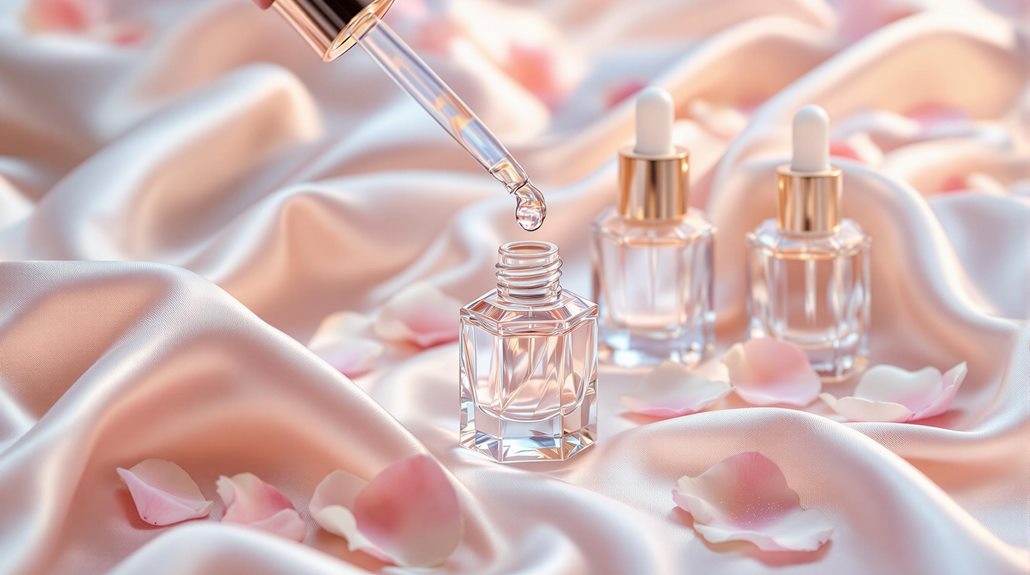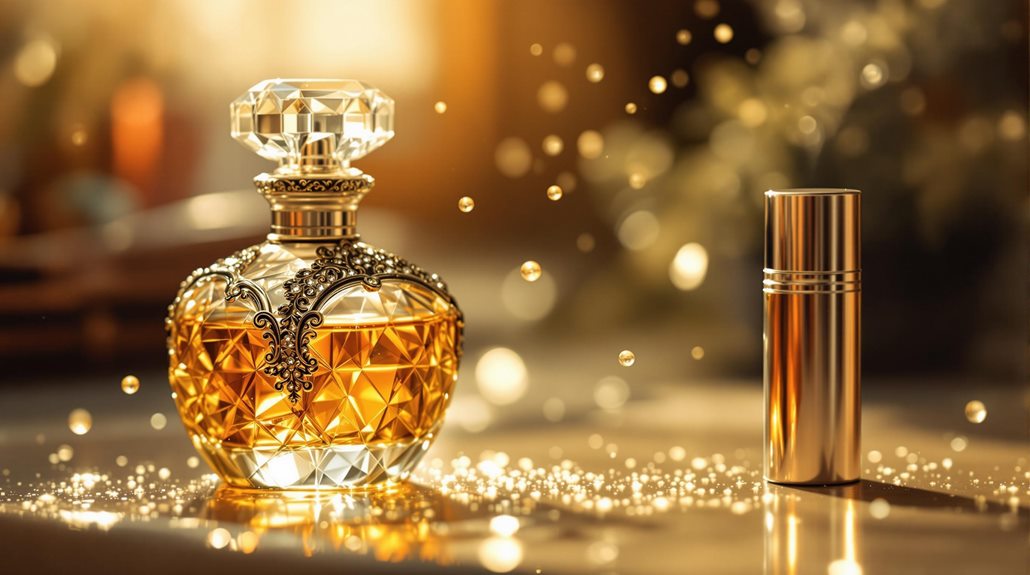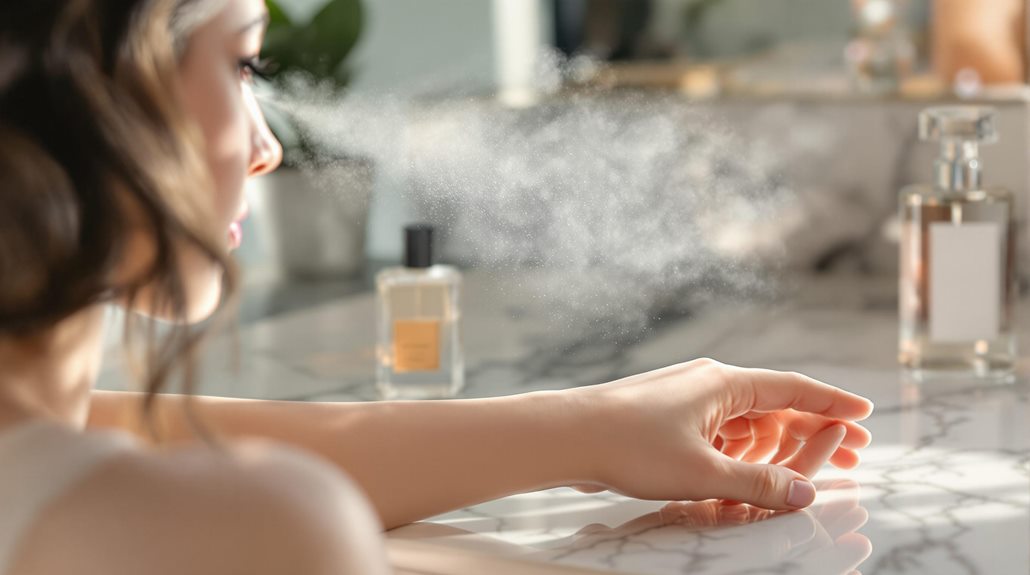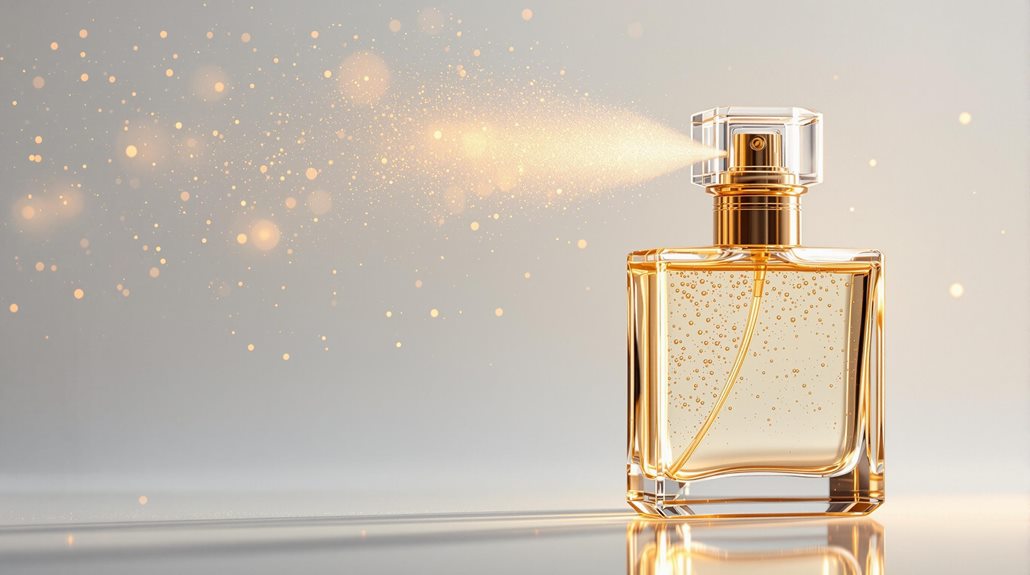How to Use Perfume Oil: Tips for a Lasting and Subtle Scent
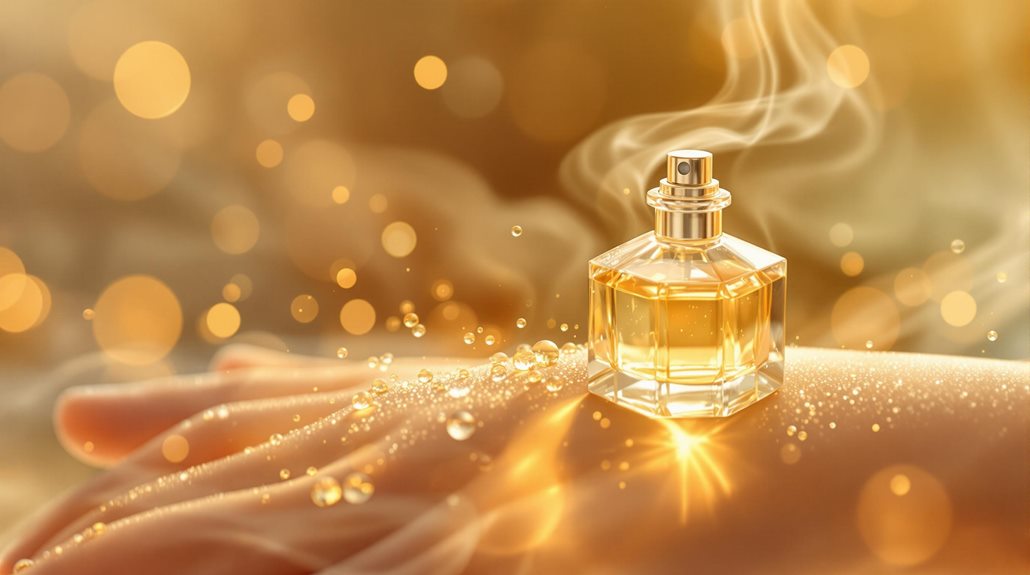
To use perfume oil effectively, start by cleansing and moisturizing your skin to create the perfect canvas. Apply the oil to your pulse points - wrists, neck, behind ears, and inner elbows - using gentle dabbing motions rather than rubbing. Don't overdo it; perfume oils are concentrated and a little goes a long way. Store your oils in dark glass bottles away from sunlight and heat to preserve their quality. For maximum longevity, layer complementary scents and consider applying to slightly damp skin or hair. These basic techniques just scratch the surface of perfume oil's aromatic potential.
Understanding Perfume Oil Basics
The world of perfume oils offers a more concentrated and potent alternative to traditional alcohol-based fragrances. Unlike conventional perfumes, these oils contain a higher concentration of pure fragrance compounds derived from natural sources like flowers, spices, and woods, without alcohol dilution. This means you'll experience a more authentic and intense scent that lasts considerably longer on your skin.
When it comes to applying perfume oil, you'll want to focus on your body's pulse points - areas where blood vessels run closer to the skin's surface. These spots, including your wrists, behind your ears, and neck, naturally warm the oil and help distribute the fragrance more effectively throughout the day. To maximize the longevity of your perfume oil, consider layering it with an unscented moisturizer or oil first. This creates a hydrated base that helps the fragrance cling to your skin longer.
Remember to store your perfume oils properly to maintain their quality. Keep them in a cool, dry place away from direct sunlight, which can alter their composition and diminish their potency over time.
Strategic Application Points
Commanding the art of perfume oil application starts with knowing exactly where to place these concentrated fragrances. Your body's pulse points are ideal locations because these areas emit heat, which helps to diffuse the fragrance molecules throughout the day.
Start by applying your perfume oil to traditional pulse points like your wrists, neck, and behind your ears. These warm spots naturally project your scent as you move. Don't forget about your inner elbows - they're perfect spots that release warmth while staying protected from excessive exposure to the elements.
For a more sophisticated approach, you'll want to select less obvious but equally effective spots. Try dabbing a small amount along your collarbone or behind your knees. These strategic points create layers of fragrance that unfold gradually as you move throughout your day. Remember to dab the oil gently onto your skin rather than rubbing it in - this preserves the fragrance's intended profile and prevents the scent from breaking down prematurely. Be mindful not to over-apply; perfume oils are concentrated, so a little goes a long way in achieving your desired fragrance intensity.
Proper Skin Preparation
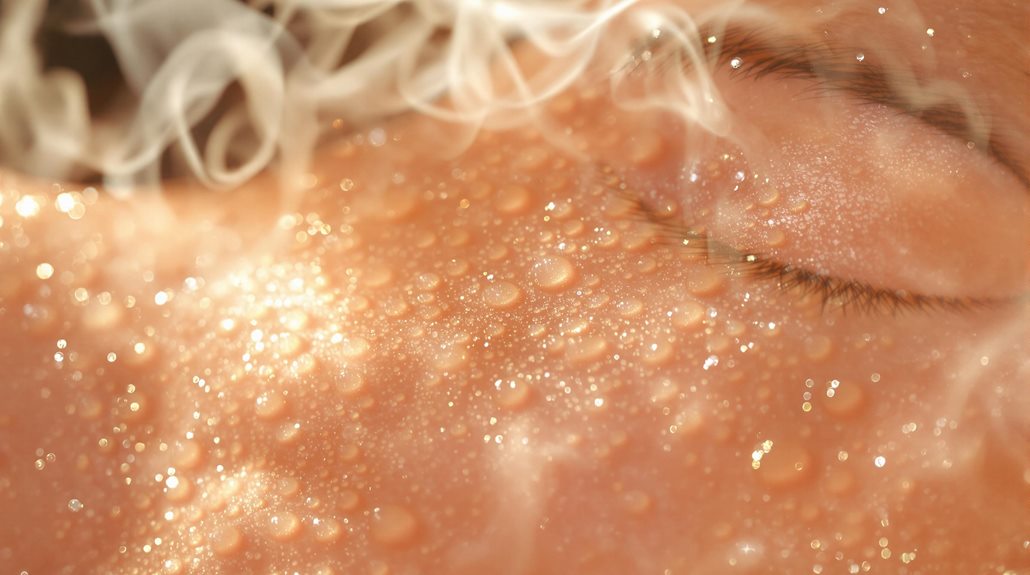
Success with perfume oils begins with proper skin preparation, as even the finest fragrances need an ideal canvas to perform their best. Your skin's condition directly impacts how the fragrance develops and projects throughout the day. To achieve a long-lasting fragrance experience, you'll want to start with clean and moisturized skin that's free from any existing scents or product buildup.
For excellent results, follow these essential preparation steps:
- Take a shower or cleanse the areas where you'll be applying the perfume oil
- Pat your skin until it's slightly damp, not completely dry
- Apply an unscented moisturizer to create a hydrated base
- Allow the moisturizer to absorb for 1-2 minutes
- Remove any residual products or old fragrances from the application areas
Your perfume oil is best applied to well-hydrated skin, as this helps prevent quick evaporation and allows the scent to develop fully. The combination of clean skin and proper moisturization creates the perfect foundation for your fragrance, ensuring it adheres properly and maintains its intended scent profile throughout wear.
Application Techniques
With perfume oil application, precision and technique make all the difference in achieving a lasting, balanced fragrance. When applying perfume oil, target your pulse points - including your wrists, neck, and behind your ears. These warm areas help the fragrance develop naturally and diffuse throughout the day. Instead of rubbing the oil into your skin, which can alter the scent profile, gently dab or pat it onto these strategic locations.
Your skin holds fragrance better when it's slightly moisturized, so try applying your perfume oil right after a shower or over a light layer of unscented moisturizer. This simple step helps your scent last longer and maintains its intended character. For precise application, use a roller ball applicator or dropper to control the amount of oil you're using - this prevents over-application while ensuring you hit the right spots.
Don't be afraid to experiment with layering different perfume oils. You can create your own signature scent by combining complementary fragrances, but start with small amounts and build gradually to find the perfect balance for your personal style.
Layering for Maximum Impact
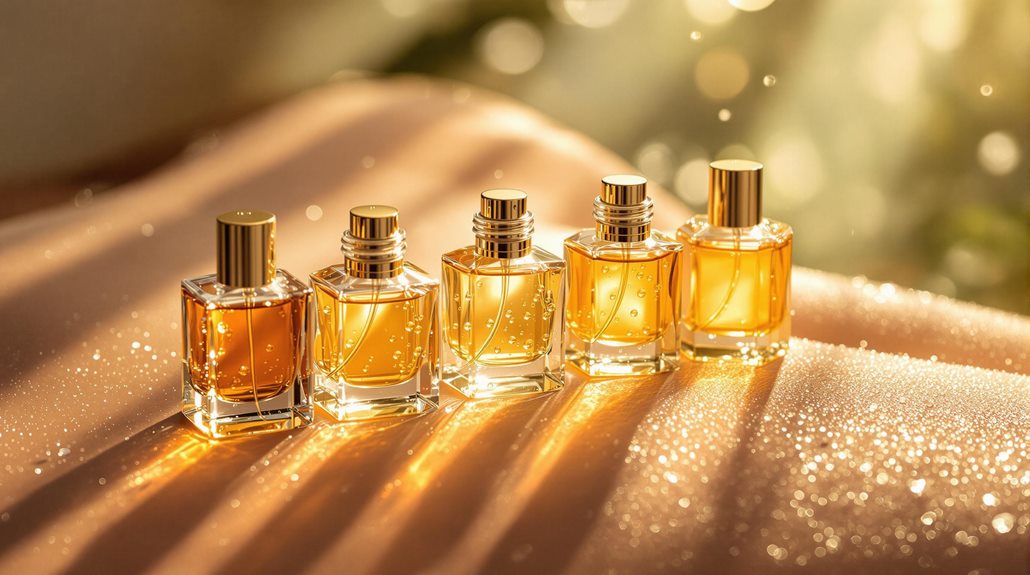
The art of layering perfume oils alters a simple scent into a sophisticated signature fragrance. When you're ready to create your personalized fragrance, start with a subtle base oil that provides lasting power. Apply perfume oil behind the ears and other pulse points, then gradually build your unique scent by adding complementary layers.
- Begin with a light, foundational oil as your base note
- Wait a few minutes between layers to let each scent settle
- Test different oil combinations on your skin before committing
- Consider the strength of each layer to maintain balance
- Keep track of successful combinations for future reference
As you experiment with layering techniques, you'll explore how different oils interact with your body chemistry. Start with smaller amounts and build up gradually - it's easier to add more than to reduce an overwhelming scent. When you need your fragrance to last throughout the day, you can reapply individual layers strategically. Remember that your body temperature and activity level will affect how the scents develop, so pay attention to how your layered combination evolves. Through practice, you'll become an expert at creating a complex, long-lasting fragrance that's uniquely yours.
Storage and Preservation Methods
Proper storage methods dramatically extend the life of your precious perfume oils and maintain their aromatic integrity. Since perfume oil is highly concentrated, you'll want to protect your investment by following specific storage guidelines to preserve its long-lasting scent.
Store your oils in dark amber or cobalt blue glass bottles to shield them from harmful UV rays. Keep them in a cool, dry place away from direct sunlight and heat sources, as temperature fluctuations can alter their chemical composition. Your bathroom isn't ideal due to humidity and temperature changes - instead, choose a drawer in your bedroom or a dedicated storage box.
Ensure bottles are tightly sealed after each use to prevent oxidation and evaporation. If you've purchased a larger quantity, consider transferring small amounts to smaller bottles for daily use, keeping the main supply sealed. You'll also want to avoid exposing your perfume oil to air unnecessarily by keeping the cap on and minimizing the time the bottle remains open. When stored correctly, most perfume oils can maintain their quality for 1-5 years, though some may last even longer.
Scent Selection Guidelines
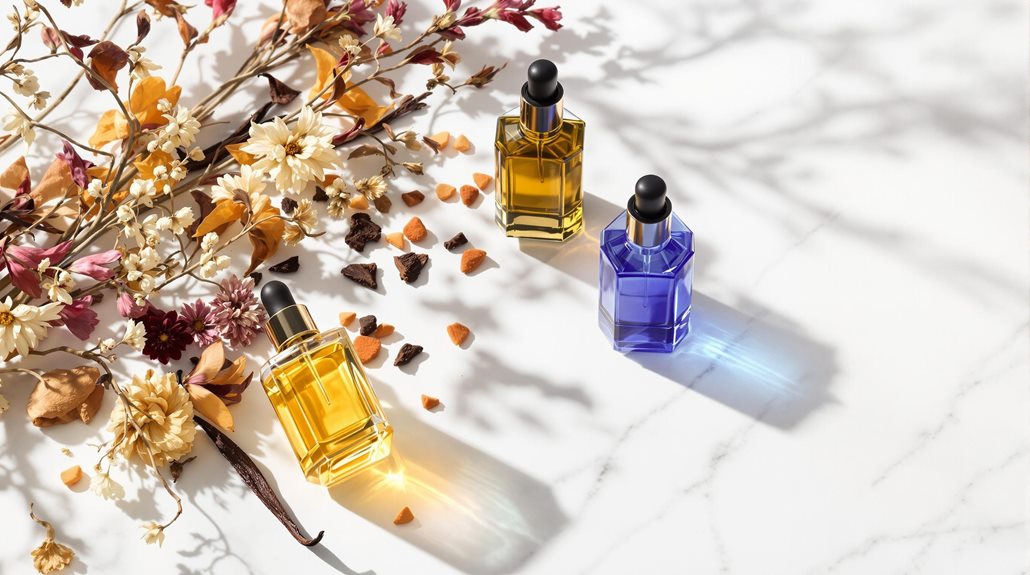
Now that you know how to preserve your perfume oils, selecting the right scent becomes your next fascinating venture. Unlike traditional alcohol-based perfumes, fragrance oils offer a more concentrated and intimate experience. You'll want to examine your personal style, body chemistry, and the occasions where you'll Use Perfume oils most frequently.
When choosing your perfect scent, remember these essential guidelines:
- Start with a small amount and test the oil on your skin, as the concentration of fragrance oils is higher than regular perfumes
- Reflect on seasonal scents - lighter florals for spring/summer, warmer notes for fall/winter
- Pay attention to how the fragrance develops on your skin over several hours
- Try layering different oils to create your unique signature scent
- Sample before committing to a full bottle, as oils interact differently with each person's body chemistry
Remember that perfume oils tend to stay closer to the skin and evolve more subtly than alcohol-based fragrances. They're perfect for intimate settings and professional environments where you want your scent to be noticeable but not overwhelming. Take time to investigate different notes and combinations until you find your perfect match.
Fragrance Longevity Tips
Making your perfume oil last longer involves several proven strategies that complement its naturally concentrated form. To augment your fragrance longevity, apply it to moisturized skin, as hydrated skin retains scents better than dry skin. Focus on your pulse points - wrists, neck, and behind your ears - where body heat will help diffuse the fragrance naturally throughout the day.
Unlike alcohol-based perfumes, perfume oils won't evaporate as quickly, but you'll still need to protect them from environmental factors that can break down the fragrance. Keep your perfume oils away from direct sunlight and store them in a cool, dark place. Don't rub your wrists together after application, as this can alter the scent's molecular structure and reduce its staying power.
You can layer your perfume oil with unscented lotion or petroleum jelly to create a base that locks in the fragrance. Another effective technique is to apply the oil to your hair, as the natural oils in your strands will help retain the scent. Remember that perfume oils are concentrated, so you'll need less product than with traditional fragrances to achieve long-lasting results.
Conclusion
Getting the most from your perfume oils doesn't have to be complicated. With proper application, preparation, and storage techniques, you'll enjoy lasting fragrance that won't overwhelm. Remember to apply oils to moisturized pulse points, layer strategically, and keep your oils in a cool, dark place. By following these guidelines and selecting scents that suit you, you'll become an expert in the art of subtle, enduring perfume oil wear.

